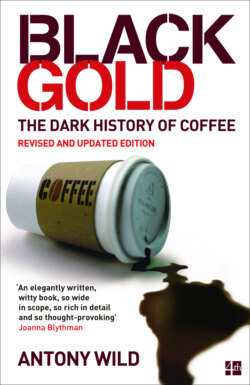Читать книгу Black Gold - Antony Wild - Страница 6
PROLOGUE
ОглавлениеOn 21 May 1502, a Portuguese fleet under Admiral João da Nova was making its way northwards from the Cape of Good Hope across the vast emptiness of the South Atlantic Ocean when the lookout unexpectedly spotted land. The ships later put in opposite a small valley with fresh water that was the only breach in the otherwise sheer cliffs of a previously unknown 47-square-mile island. Da Nova named the discovery St Helena, after the mother of the Emperor Constantine whose Saint’s Day it was. The sailors briefly explored the island, finding an unpopulated Garden of Eden free of all predators and poisonous insects, the rich volcanic soil of its steep mountains luxuriantly wooded with ebony, gum-wood, and fruit trees. Following the traditional mariners’ practice of the time, they put some goats ashore for the benefit of future visitors before they left for home.
In about the same year, in Yemen in southern Arabia, a new drink made from the fruit of a plant of Ethiopian origin had made its first appearance. Coffee’s popularity expanded rapidly throughout the Islamic world, and it was in fairly wide use by the time its consumption first attracted controversy in Mecca in 1511. By the end of the sixteenth century, European merchants and travellers began to venture warily into the confines of Ottoman Empire and reports of the ‘Wine of Araby’ began to reach the West, soon followed by the drink itself, which became very popular in seventeenth-century Europe, especially in England, France, and Holland. The European maritime powers realized that the virtual monopoly the Yemeni port of Mocha held on the coffee trade could be circumvented if they themselves started coffee plantations in their new tropical colonies. First the Dutch, then the French, managed to obtain coffee seedlings from Yemen. The English East India Company likewise managed to take some seeds from Mocha to St Helena in 1732, where, neglected, they grew virtually in the wild until their recent rediscovery.
By the middle of the eighteenth century European colonies dominated the world coffee trade, meeting the demands of eager consumers at home from plantations frequently worked in conditions of slavery or near-slavery. In the meantime, St Helena – the world’s most isolated island – played a role of great strategic importance in the maintenance of British power in the East. For all its remoteness, the island was visited by many of the luminaries of the Raj as they returned from India and beyond, and was chosen by the British Government as the only suitably secure location for the exile of Napoleon after his defeat at Waterloo in 1815.
Today, one of the world’s rarest and most expensive coffees comes from St Helena, grown from plants directly descended from those introduced by the East India Company in 1732. The island is still a British Overseas Territory, an anachronistic remnant of the Empire upon which the sun never set. Whilst its coffee may be admired by connoisseurs, the environment of the island itself has degraded enormously since its discovery: descendants of da Nova’s goats ravaged the trees, its endemic ebony was made virtually extinct, and other man-made disasters stripped the island of its rich topsoil, exposing the forbidding volcanic rock that now forms most of its surface. The island lost its strategic significance with the opening of the Suez Canal: it has no airport and can be reached only by one heavily subsidized ship.
Many of the momentous events and grand personages of world history have scratched ghostly messages on the black basalt of St Helena, and deciphering them in this isolated context conveys a curious sense of the underlying connectedness of the island with the pivotal phenomena of that larger world. Thus da Nova’s fleet was returning from India, where the Portuguese were starting to build a trading empire that was to dominate the Indian Ocean for the next century; the East India Company was threatening to usurp that empire by the time it took possession of the island in 1659; the Dutch and French success with growing coffee in their colonies outshone that of the Company, whose neglected seedlings were buffeted by the southern trade winds; Napoleon had introduced to Europe the drinking of chicory as a coffee substitute under his ‘Continental System’ and, during his exile, he planted a coffee tree in his garden that died from exposure to those same winds; the island became a refuge for captured slave ships after abolition and one such was on its way to Brazil, where slavery was the cornerstone of that country’s coffee industry …
The 5000-strong population of St Helena has been used recently as a kind of Petri dish by sociologists wishing to study the effects of television – introduced only in the last few years – on everything from crime rates to Girl Guide membership. In this book, the island will also be used as a Petri dish: we will return to it repeatedly to study how the history of coffee and colonialism evolved together over the last five hundred years to forge an unholy alliance that still exists for the benefit of Western coffee consumers at the expense of the people of the Third World countries – more often than not former colonies – that produce it, and of the planet itself.
